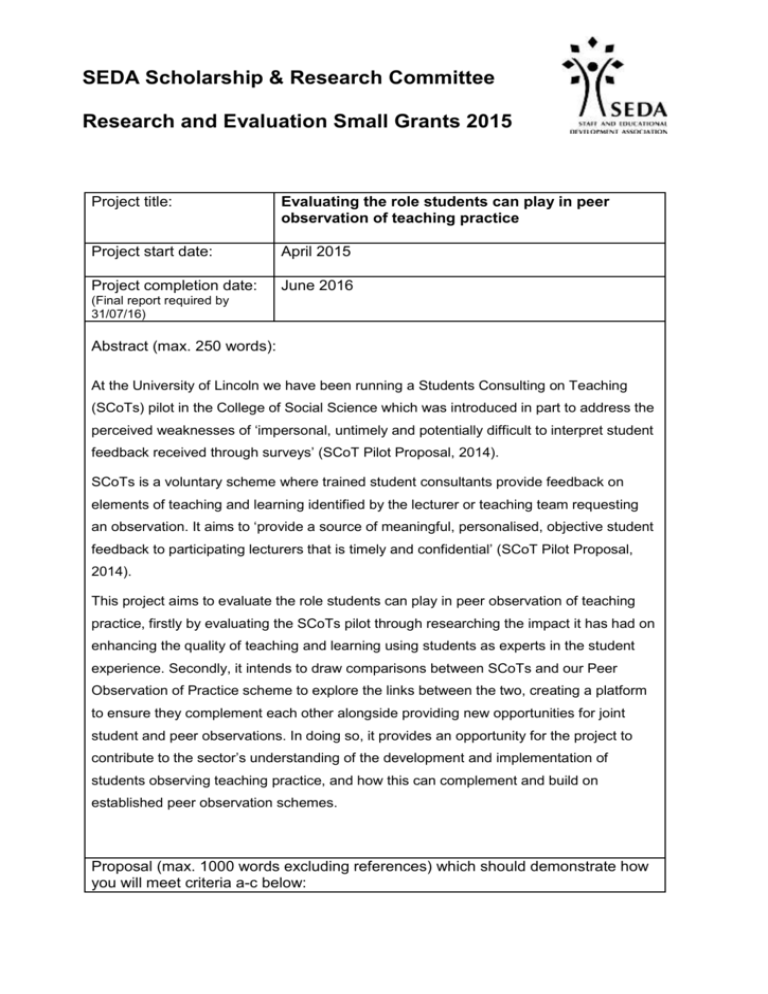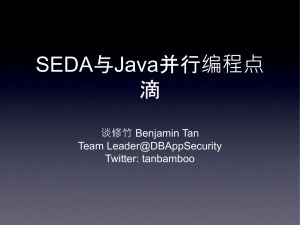Please find the summary of the SEDA project here
advertisement

SEDA Scholarship & Research Committee Research and Evaluation Small Grants 2015 Project title: Evaluating the role students can play in peer observation of teaching practice Project start date: April 2015 Project completion date: June 2016 (Final report required by 31/07/16) Abstract (max. 250 words): At the University of Lincoln we have been running a Students Consulting on Teaching (SCoTs) pilot in the College of Social Science which was introduced in part to address the perceived weaknesses of ‘impersonal, untimely and potentially difficult to interpret student feedback received through surveys’ (SCoT Pilot Proposal, 2014). SCoTs is a voluntary scheme where trained student consultants provide feedback on elements of teaching and learning identified by the lecturer or teaching team requesting an observation. It aims to ‘provide a source of meaningful, personalised, objective student feedback to participating lecturers that is timely and confidential’ (SCoT Pilot Proposal, 2014). This project aims to evaluate the role students can play in peer observation of teaching practice, firstly by evaluating the SCoTs pilot through researching the impact it has had on enhancing the quality of teaching and learning using students as experts in the student experience. Secondly, it intends to draw comparisons between SCoTs and our Peer Observation of Practice scheme to explore the links between the two, creating a platform to ensure they complement each other alongside providing new opportunities for joint student and peer observations. In doing so, it provides an opportunity for the project to contribute to the sector’s understanding of the development and implementation of students observing teaching practice, and how this can complement and build on established peer observation schemes. Proposal (max. 1000 words excluding references) which should demonstrate how you will meet criteria a-c below: ’Reflective practice has an allure that is seductive in nature because it rings true for most people as something useful and informing. However, for reflection to genuinely be a lens into the world of practice, it is important that the nature of reflection be identified in such a way as to offer ways of questioning takenfor-granted assumptions and encouraging one to see his or her practice through others’ eyes’ (Loughman, J.J. 2002, p. 33) Reflection on teaching practice is seen across the sector as a key way to enhance the quality of teaching and learning. This can be demonstrated by the prominence of Peer Observation schemes across a multitude of institutions, which ‘became popular in the UK in response to the establishment of the Quality Assurance Agency and a sector-wide agenda to monitor and develop teaching quality (Quality Assurance Agency 2000)’ (Yiend et al, 2014, p. 466). Our institutional Peer Review of Practice (PROP) scheme at Lincoln ‘seeks to provide a process which supports staff in their development of HE teaching practice and understanding of students’ learning’ (University of Lincoln PROP Staff Handbook, 2013). When SCoTs was introduced, a key aim was to ‘provide lecturers with feedback that helps them gain a better sense of the student experience within their class resulting in better teaching and improved facilitation of student learning’ (SCoT Pilot Proposal, 2014). This highlights the clear links between PROP and SCoTs, however work needs to be done on the evaluation of SCoTs in order to explore the impact student observations can have on the development of teaching practice and to explicitly explore how this can link with PROP. There is currently a moderate amount of research surrounding peer observation of practice however literature on the role of students in educational development is still limited. This project contributes such an understanding by evaluating the impact SCoTs has had and paying particular attention to how it might be integrated in mainstream academic development activity rather than being a standalone project run from a student engagement angle. In the most recent issue of Educational Developments Reed argues that the application of Brookfield’s lenses can have a big impact on staff development as ‘by reflecting critically upon our own experiences, in light of educational literature, and in consideration of the perspectives of colleagues and students, we can make better choices in our daily work’ (Reed, 2014, p.5) This research and evaluation project will build on this argument, beginning to draw different perspectives together in order to create a quality teaching and learning experience. Implications (max 250 words): This section should demonstrate how your proposal meets criterion d) In Terms of Engagement: Reflections from the SEDA Spring Teaching, Learning and Assessment Conference 2014, reflecting SEDA’s Spring Teaching, Learning and Assessment Conference 2014, during which Dan Derricott, Student Engagement Manager at the University of Lincoln ‘defined student engagement as ‘working in partnership with students to improve the quality of what we do’’ (Taylor, C. 2014, p.3), Taylor suggests ‘maybe SEDA is now ready to explore more formal acknowledgement and recognition of students as educational developers.’ We hope this proposal can kick-start this exploration and build on Reed’s argument that Brookfield’s reflective lenses are a useful tool for educational development and improving the quality of what we do by applying different perspectives to critically reflect and enhance the quality of teaching and learning. We will do this at Lincoln by introducing an effective joint student/peer observation scheme based on the evaluation of current practice. The evaluation of this pilot will also allow us to disseminate our research through conferences and by producing case-studies which can be used across the sector and therefore allows this project to have an impact both within and outside our institution. References Crawford, K. Derricott, D. & Mersh, A. (2014) Student Consultants on Teaching (SCoT) Proposal 2014-15. Submitted to University of Lincoln Education Committee. Loughman, JJ. (2002) Effective Reflective Practice. Journal of Teacher Education. 53 (1). p. 33-43 (SAGE journals) Reed, P. (2014) Using Brookfield’s reflective lenses in educational development, Educational Developments, Issue 15.4, p. 3-5 (SEDA) Taylor, C. (2014) Terms of engagement: Reflections from the SEDA Spring Teaching, Learning and Assessment Conference, Educational Developments, Issue 15.3, p. 1-3 (SEDA) Peer Review of Practice Staff Handbook (2013), Centre for Educational Research and Development, University of Lincoln Yiend, J. Weller, S. & Kinchin, I. (2014) Peer observation of teaching: The interaction between peer review and developmental models of practice. Journal of Further and Higher Education. 38 (4). p. 465-484








